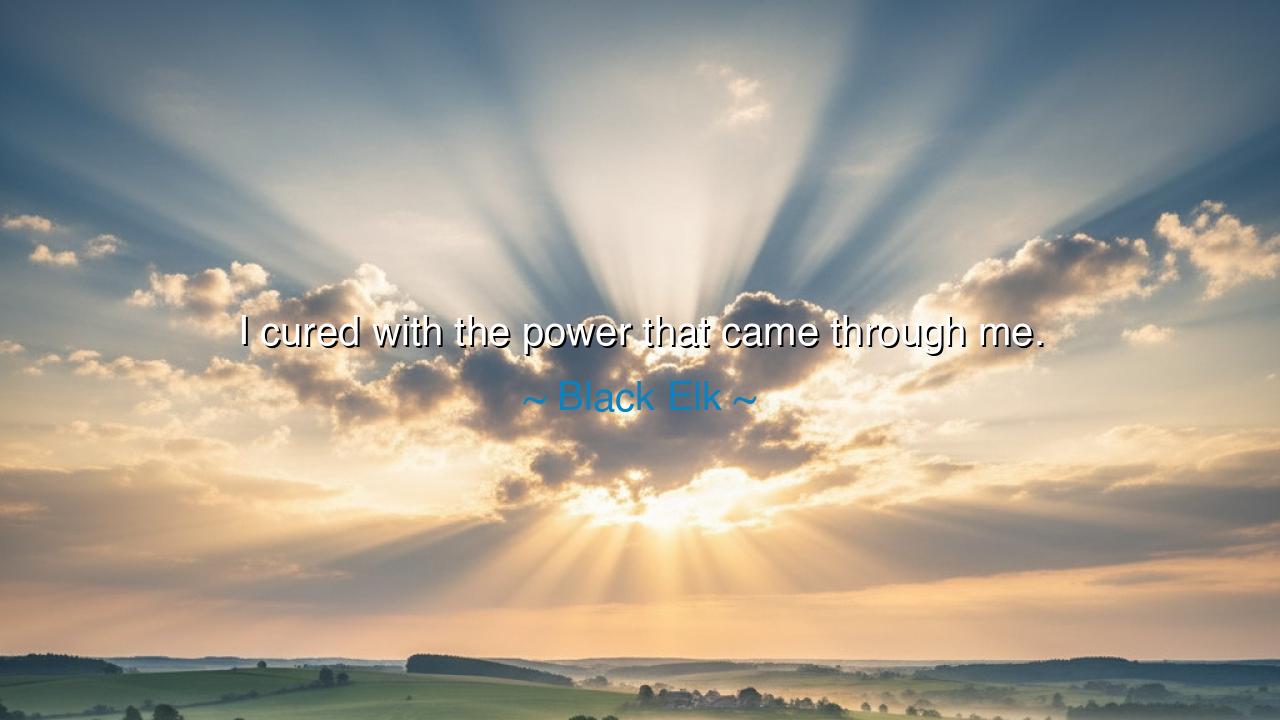
I cured with the power that came through me.






In the days when the earth was young and the sky still spoke to the hearts of men, there walked among the Lakota Sioux a holy man named Black Elk. His words, “I cured with the power that came through me,” reveal a sacred truth: that true healing does not come from the hands of mortals alone, but from a divine force that flows through them like a river through a vessel. The healer is not the source of this power, but its humble servant, chosen to guide it toward those in need.
Power, in its highest form, is not seized or owned; it is received. When Black Elk speaks of the power “coming through” him, he acknowledges that he was merely a channel for the Great Spirit, the eternal source of life and balance. This teaches us humility, for those who believe they heal by their own might risk falling into pride and corruption. The healer’s role is not to claim glory, but to stand between the worlds of spirit and flesh, allowing divine grace to move freely into the realm of suffering.
Throughout history, many have been vessels for such sacred power. Consider the tale of Joan of Arc, a young maiden who heard voices she believed were sent by heaven. She did not claim greatness for herself, but rather acted as an instrument of divine will, leading France to victories that seemed impossible. Like Black Elk, her strength was not hers alone—it flowed through her, guided by a higher force. Even when she faced death, her faith remained unbroken, proving that true power cannot be destroyed by fire or sword.
Black Elk’s words also remind us that healing is not limited to the body. His cures were for the spirit, the heart, and the very harmony of the people. In times of war and displacement, when his tribe suffered under the crushing weight of conquest, his visions brought them hope and meaning. This reveals that to cure is not only to mend wounds but to restore balance between humans and the greater world. Such healing is as vital to a nation as it is to an individual.
Let this wisdom be carried to future generations: seek not to hoard power, but to become a pure vessel for it. Whether through acts of mercy, words of guidance, or deeds of courage, allow the divine to flow through you. For the greatest healers and leaders are not those who shout of their strength, but those who kneel in humility, knowing they are but instruments of a force far greater than themselves. In this lies the secret of true healing, and the path to harmony with all creation.






LPNguyen Lan Phuong
I feel both awed and curious reading this. It emphasizes the idea that true power is not imposed, but flows through presence and authenticity. Could this imply that anyone has the potential to affect others positively if they cultivate self-awareness and focus their intentions? I also wonder how modern science or psychology might interpret this concept—whether it aligns with ideas of energy, consciousness, or the placebo effect in healing practices.
TTThuy Trang
This quote sparks reflection on the relationship between personal integrity and influence. Is it possible that the healer’s effectiveness derives not from rituals or remedies alone, but from the alignment of their character, focus, and intention? I wonder whether this concept of power can extend to other domains, like education or art, where the energy of the individual has a transformative impact on others. Could this suggest a universal principle of human connection?
TMTien Minh
I find this statement both mysterious and profound. Could Black Elk be suggesting that the act of curing is as much about the healer’s spirit as it is about the patient? I’m curious whether this principle applies beyond physical healing to emotional or social restoration. How does one cultivate this inner power, and what role does intention, humility, or respect for natural forces play in making such energy effective and ethical?
ABAnh Bui
Reading this, I feel inspired and contemplative. It raises questions about the nature of power and responsibility. If one can channel a force through oneself to heal others, what does that imply about the connection between self-awareness, empathy, and effectiveness? I also wonder how this perspective might influence our understanding of leadership, mentorship, or counseling, where the 'power within' can guide and transform others in subtle but meaningful ways.
DNDuong Nguyen
This quote makes me reflect on the idea of personal energy or inner power as a source of healing. I wonder whether Black Elk is referring to spiritual strength, a connection to nature, or a deeper understanding of human life. Could it be that true healing comes not from external tools but from the authenticity and presence of the healer? I’m curious about how this philosophy compares to modern medical practices and holistic approaches.